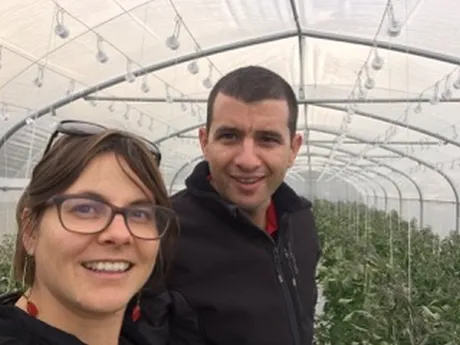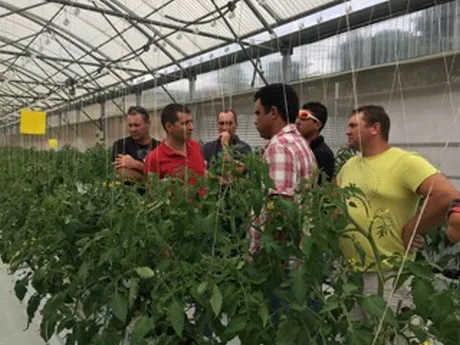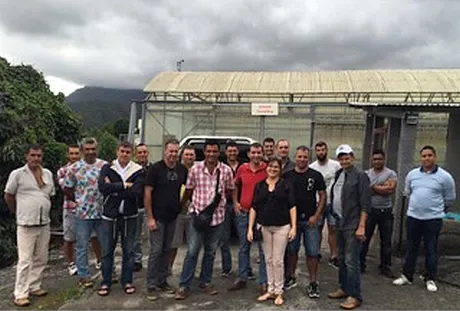
Aurore and Jean Marc in a Réunion greenhouse
Jean Marc and Aurore were born on the Island of Réunion, but they both gained experience and an extensive background in horticulture, working as growers and advisors at several greenhouse companies and cooperatives in France, Réunion, Morocco and the UK. Recently, the couple teamed up with their company JMHorti-Consulting, helping Réunion farmers and growers to optimize their operations and guide them on the way to produce more sustainably and responsibly.
Aurore is specialized in guiding open field production and developing soilless strawberry and fruit cultivation. In her previous function she worked as a consultant for local Réunion farmers cooperatives, helping them to integrate sustainable production practices. Her husband Jean Marc is specialized in greenhouse growing; he gained extensive experience serving as a grower at leading growers in Europe and North Africa, specialized in hydroponic tomato, melon and pepper cultivation.

Jean Marc consulting growers
Greenhouses on Réunion
In order to become more self sufficient, the first greenhouses appeared on the remote Island in the late 1990s. Ever since, many small greenhouses, with sizes no larger than 5,000 meters, due to the hilly nature, have been established on the Island, mainly in the southern part. Nowadays, the production output of all of those smaller greenhouse together is enough to make the Island self sufficient for the supply of tomatoes, melons, peppers and soft fruit.Jean-Marc and Aurore consult many of these greenhouse growers and help them to achieve better results in their tomato, bell pepper, strawberry and melon production. The couple explained that the horticultural industry on Réunion is facing several challenges.
"The growers realize they need to start producing as efficient as possible. On one side they do it from an economic point of view; the price of labour is just as high as in France, and so is the cost price of the produce. On the other side, there is often not so much knowledge available on how to achieve better production and how to cope with growing in a tropical climate. The technical level is not very well established yet and a lot of improvement can still be achieved. As well as this the population of Réunion is estimated to grow from 850,000 to 1 million people over the next few years."
Biologicals
Aurore said that for this reason there now is an increasing interested in optimizing production with the help of integrated crop protection. "Currently the mentality of the growers is changing towards a more sustainable one. We help growers teaching them how to implement alternatives for pesticides and make their production more efficient", said Aurore. "This is necessary to keep up with present day standards and in order to save the environment of the Island too."According to Jean Marc, there is a lot of competence among the growers for the use of biological control. "We gained a lot of experience with biological practices during our careers at growers in Europe. We now try to help the Réunion growers and farmers to integrate these solutions too."
Seasons and Climate
Réunion greenhouse growers often combine their production with other crops like open field vegetables or a few hectares with row crops like sugar cane or even livestock. This allows them to produce year round, filling the gaps between the various planting seasons."Because the climates vary from location to location, some growers can produce year round, and others not. Some of the growers have a greenhouse both in the countryside and on the seaside, in order to divide the production over the year. The greenhouses are often simple plastic greenhouses, with not much climatic technology inside. This is also because they can not be insured and protected against cyclones, so farmers will not invest too much."

Jean Marc and Aurore and their customers on the Island of Réunion
Younger generation
Over the next few years, Jean Marc and Aurore expect to see an increase in sustainable production practices on their Island. The growing population, the decrease of available pesticides, plus consumers are becoming aware of what they are eating; all factors that will play a key role for the development of their consultation. While the country is not really ready for the introduction of organic cultivation yet, this might come into the picture soon too."Nowadays there is a complete new generation of both consumers and farmers, so we foresee a bright future of a more sustainable horticultural development on our Island."
For more information:
JmHorti-Consulting
Jean Marc Hoarau & Aurore HOARAU-Ferrante
jmhorticonsulting@gmail.com
